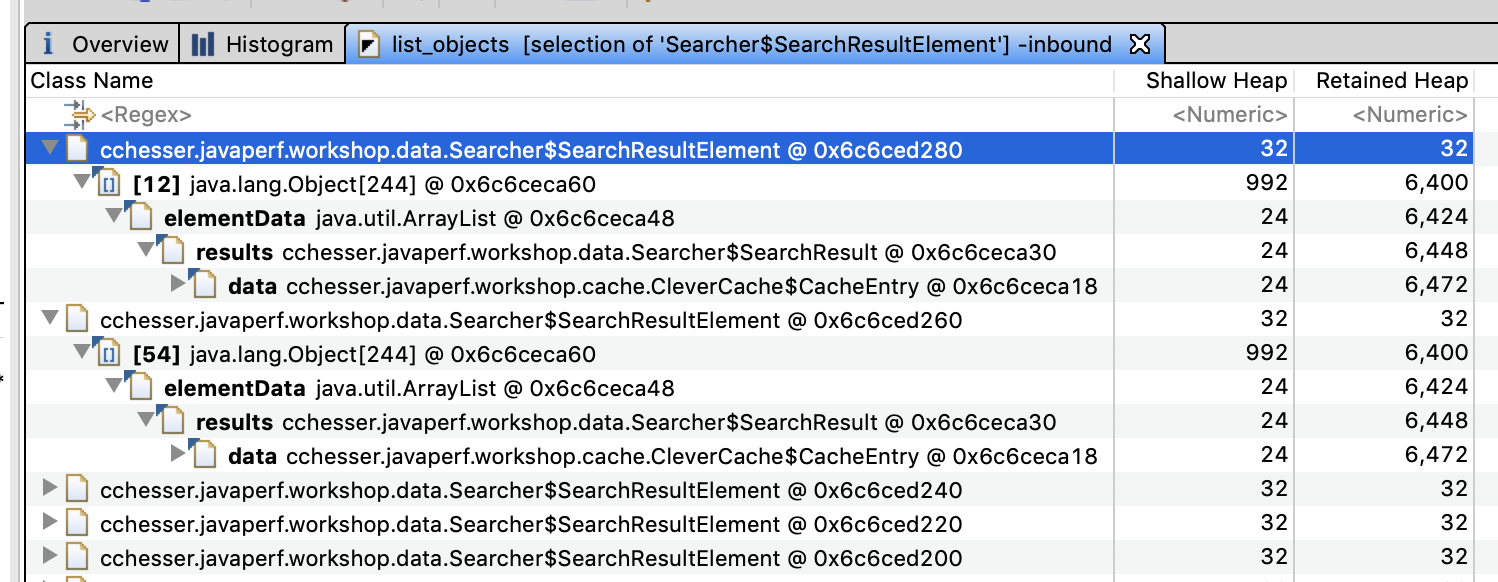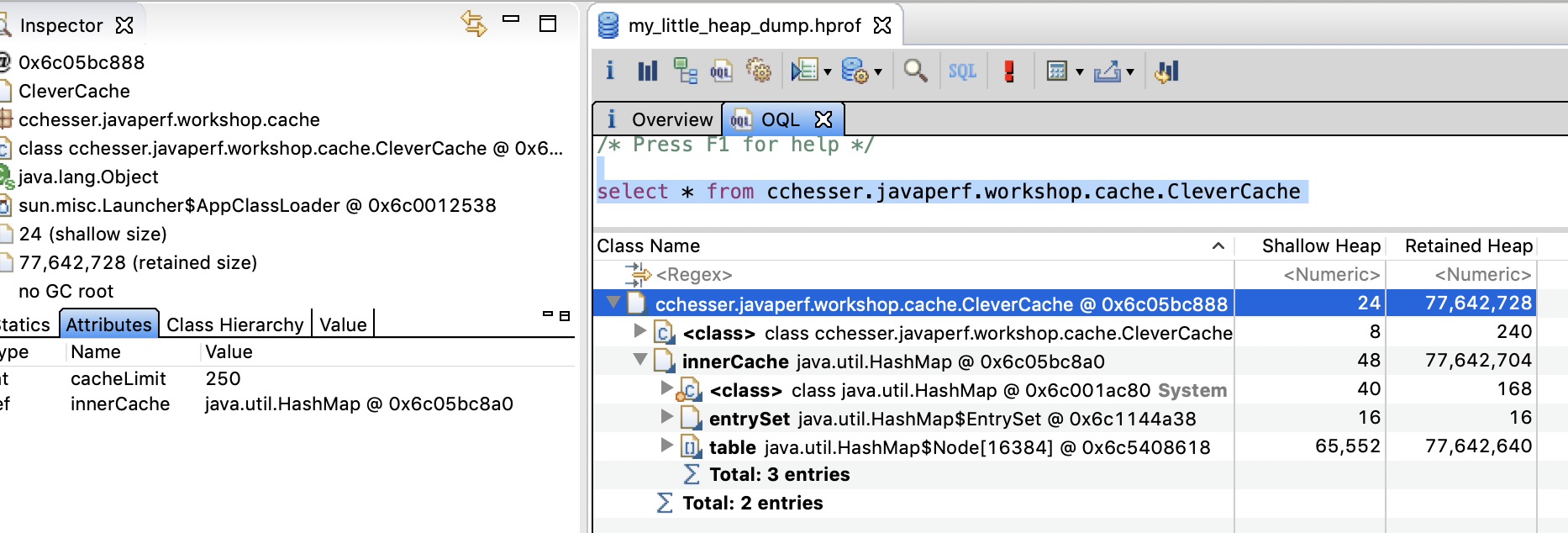Memory Challenge
The provided WorkshopService has an intentional memory problem, use the previous sections as reference to try to pin point it.
Tips
- With the Dominator Tree (Eclipse MAT) determine what object would free up the most memory (if we could get rid of it)
- With the Histogram (Eclipse MAT) determine what type of object has the most instances
- Using the Incoming Objects view, find out what’s pointing to them.
Once you’ve found the large object, look through it’s properties and determine why this object holds on to so many other objects.
This section contains a solution, make sure you’ve given things a shot before spoiling the fun.
Dominator Tree
A first glance at the dominator tree will point us to a io.dropwizard.jetty.MutableServletContextHandler, which is something controlled by the DropWizard framework. Let’s dig through its references until we find some classes in the cchesser package.

The first instance of a class we “own” is cchesser.javaperf.workshop.resources.WorkshopResource

Let’s look at it’s properties a bit, and we’ll find a cchesser.javaperf.workshop.cache.CleverCache reference with about 70% of the memory consumption.

We’ll look at its properties in a bit more detail in the following sections.
Histogram View
A first glance at the Histogram View (sorted by retained heap), shows us about 2,000,000 instances of cchesser.javaperf.workshop.data.Searcher$SearchResultElement

Looking through the references to an instance of this type, we end up being referenced by the data field in cchesser.javaperf.workshop.cache.CleverCache$CacheEntry

We can further inspect the Incoming References for a particular entry, and see what is pointing to it, tracing it back to something we own:

Once again, we’ve ended up at cchesser.javaperf.workshop.resources.WorkshopResource, specifically a field called resultsByContext.
We’ll take a closer look at this cchesser.javaperf.workshop.cache.CleverCache object.
Inspecting Clever Cache
First, lets determine how many instances of cchesser.javaperf.workshop.cache.CleverCache we have. We’ve found a single instance that is about 70Mb (in our sample dump), so let’s double check if there’s more of these.
We can do that in a couple of ways:
- Use the histogram view to filter on
CleverCache

- Use OQL to find instances of that object:
select * from cchesser.javaperf.workshop.cache.CleverCache

Fields/References
We can find the fields and references for an instance using either Eclipse MAT or VisualVM.
In Eclipse Mat, the fields for an instance display in an Attributes tab

In VisualVM, we can load the Objects view and apply a filter on class name to then inspect the fields and references

Looking at the properties, we find that there’s a cacheLimit of 250. Let’s find out exactly how many entries are in the cache (the innerCache field).
Finding Sizes
Let’s write a query that will show us what the count of entries in the cache is.
- For our query, we need to pull the
cacheLimitandsizeof theinnerCachemap,
We can do this a few ways:
Eclipse MAT / OQL
we can do that with the following query:
SELECT c.cacheLimit AS "max entries", c.innerCache.size AS entries FROM cchesser.javaperf.workshop.cache.CleverCache c

Eclipse MAT / Calcite
select c.cacheLimit as "max entries", getSize(c.innerCache) as "entries"
from cchesser.javaperf.workshop.cache.CleverCache c

VisualVM / OQL
var caches = heap.objects("cchesser.javaperf.workshop.cache.CleverCache")
function report(cache) {
return { maxEntries: cache.cacheLimit, entries: cache.innerCache.size }
}
map(caches, report)

That doesn’t seem right at all, we want at most 250 items but we have about 10,000. Let’s find out why that is the case.
Memory Problem Explained
The interaction between the WorkshopResource and CleverCache happens through the /search resource.
cchesser.javaperf.workshop.WorkshopResource
@GET
@Path("/search")
@Produces(MediaType.APPLICATION_JSON)
@Timed
public Searcher.SearchResult searchConference(@QueryParam("q") String term, @QueryParam("c") String context) {
return fetchResults(term, context);
}
private Searcher.SearchResult fetchResults(String term, String context) {
if (context != null && !context.isEmpty()) {
if (resultsByContext.exists(context)) {
return resultsByContext.fetch(context);
}
}
// does not exist in cache, compute and store
SearchResult results = searcher.search(term);
resultsByContext.store(results.getResultsContext(), results);
return results;
}
If a context is sent, the previously cached values for the search are returned, otherwise we cache those result values in case they need to be referenced again.
javaperf.workshop.cache.CleverCache
/**
* Stores the given key value pair in the cache
*
* @param key the unique identifier associated with the given value
* @param value the value mapped to the given key
*/
public void store(K key, V value) {
if (isFull()) {
K keyToRemove = getLFUKey();
CleverCache<K, V>.CacheEntry<V> removedEntry = innerCache.remove(keyToRemove);
}
CacheEntry<V> newEntry = new CacheEntry<V>();
newEntry.data = value;
newEntry.frequency = 0;
innerCache.put(key, newEntry);
}
// other methods
private boolean isFull() {
return innerCache.size() == cacheLimit;
}
This interaction is NOT thread safe. Consider this scenario:
- Thread 1 invokes
storewhen theinnerCache.size()is249isFull()evaluates tofalse- Execution halts prior to
innerCache.put
- Thread 2 invokes
storewhen theinnerCache.size()is249isFull()evaluates to false- Execution halts prior to
innerCache.put
- Thread 1 resumes and executes
innerCache.put,innerCache.size()is now250 - Thread 2 resumes and executes
innerCache.put,innerCache.size()is now251 - For the lifecycle of the jvm
isFull()will no longer returntrue
Fortunately, the DropWizard documentation calls out the need to consider thread safety:

Since the WorkshopResource has a resultsByContext field that will get shared across threads, that type should be thread safe.
Potential Solutions
-
The naive solution would be to just change
isFull()to consider>=, though that might lead to ConcurrentModificationExceptions -
The proper solution would be to make the class Thread Safe
In the next section, we'll continue learn about Garbage Collection logs.
Garbage Collections